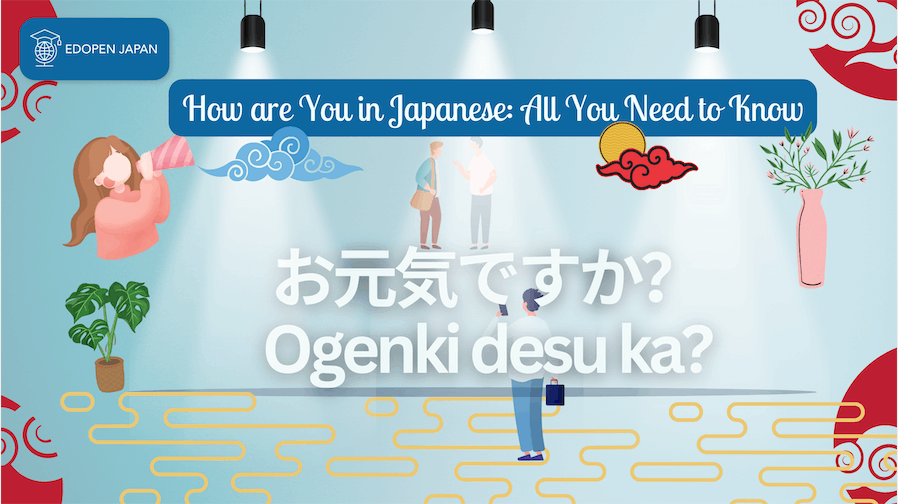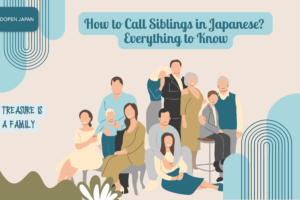The Japanese language will be much more interesting if we know it and practice it fluently every day. The more sentences and phrases we know, the easier it will be to master them.
Surely you’ve heard the Japanese expressions 元気ですか? (genki desu ka?) or お元気ですか (ogenki desu ka?) when you watch anime, J-dramas and so on, right? If you try to translate it in Google translate, it means “how are you? So the question is, how do you use it?
Getting through this article, you would get a complete explanation useful for you to grasp the meaning of genki desu ka itself. So that you would easily understand the use of this greeting expression of genki desu ka, let’s see the full explanation as follows.
Also, see below how to thank or acknowledge someone in a polite and correct way in Japanese:
Read also:
11 Great Ways to Express Sorry in Japanese
The Most Valuable Things to Know about “Wakaranai (分からない)”
Everything You Need to Know about “Daijoubu (だいじょうぶ)”
Contents
1. The meaning of 元気ですか? (genki desu ka?)
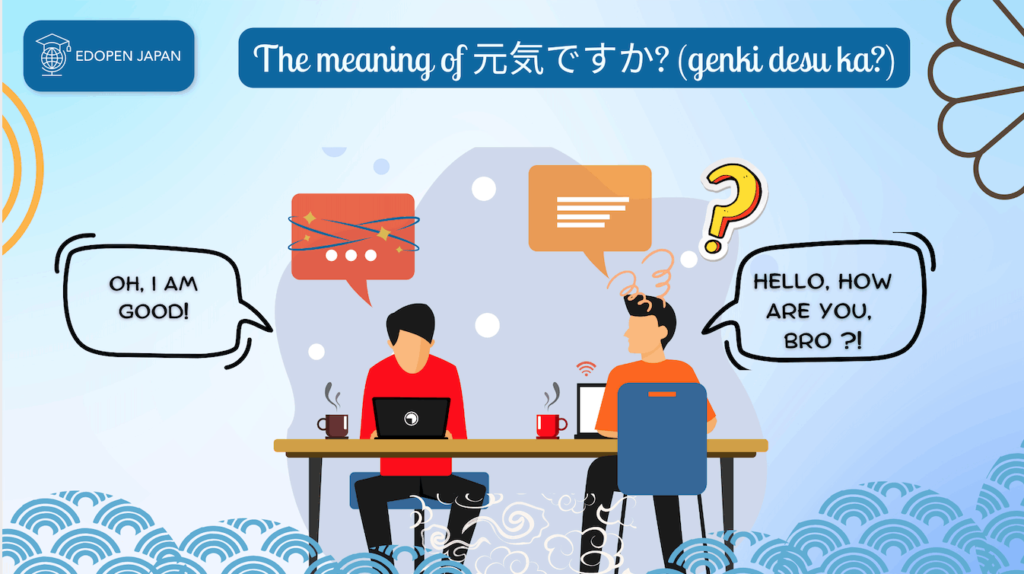
As briefly mentioned previously, Genki or Ogenki desu ka is a greeting or 挨拶 (aisatsu) that is often used in everyday conversation in Japan. This aisatsu or greeting in Japanese means “how are you?” or “are you well?” which is used to ask about the situation or news of the other person.
This aisatsu, either genki desu ka or ogenki desu ka, is usually used when you meet people you haven’t seen in a long time. Please note, however, that the ogenki desu ka greeting is usually used when writing letters, e-mails or calling someone.
The examples of conversation
Please take a look at the conversation below:
A: 元気ですか?
Genki desu ka?
How are you? or Are you healthy?
B: はい、元気です。
Hai, genki desu.
Yes, I’m fine.
as well as the following conversation:
A: お元気ですか?
Ogenki desu ka?
How are you? or Are you well?
B: おかげさまで、元気です。
Hai, Okagesamade, genki desu.
Yes, Thanks to God’s grace, I’m fine.
About 元気ですか? (Genki desu ka?) & お元気ですか? (Ogenki desu ka?)
There are 2 ways to say genki desu ka in Japanese, just use it as genki desu ka or add ‘o’ before ‘genki’ to make it ogenki desu ka. Using ‘o’ before ‘genki’ makes it more polite and formal than not using it. You can use it for your superiors, your boss, or someone you respect.
And if you do not use ‘O’ before ‘genki’, the meaning would be casual and you can use it for your friend or someone in a similar position to you.
There is also a new phrase you can use when someone asks you a question using the phrase “Genki desu ka? Then you can reply as you would in a conversation, using おかげさまで、元気です。or Okagesamade, genki des.
お陰さまで (Okagesamamade) is a Japanese expression used to express gratitude for someone’s help that has resulted in a positive outcome. In this case, we also use it to express our gratitude for God’s grace in making our bodies healthy.
Also, “ogenki desu ka” is sometimes only used for people who haven’t seen the speaker for a long time. Meanwhile, the phrase “おかげさまで、元気です” or “hai, okage sama de, genki desu” is used in response to “ogenki desu ka”.
About the honorific お (O) or 御 (Go)
Again, most of the words “ogenki desu ka” are only used as greetings in writing letters, e-mails, etc. (It is rarely used in everyday conversation). The ‘O’ or ‘Go’ is the prefix used as an honorific, usually added before some specific words to express politeness and respect for the speaker.
In addition, the speaker may use this greeting with general or non-specific people in one-way conversations such as TV shows, speeches, etc.
On the other hand, it is considered inappropriate to use this greeting with people the speaker meets frequently, such as school friends, work colleagues, family members who live together at home, or people you meet often, because it gives a stiff and strange impression.
The prefix “O” in “ogenki desu ka” is used to smooth out the word “genki”, which means “healthy”. “Desu” also shows subtlety to the other person, so it can be used as a polite greeting.
As a special supplement for you, to deepen your understanding and broaden your preferences regarding “genki desu ka”, here are the other expressions that can be used similarly to genki desu ka or usually follow genki desu ka when said in practical everyday life.
The meaning of お元気でしたか (ogenki deshita ka?)
The expression ‘ogenki deshita ka’ is the past form of ‘ogenki desu ka’. The greeting “ogenki deshita ka” is also used to inquire about the condition of an interlocutor who has not formally met the speaker for a long time.
The difference between “ogenki deshita ka” and “ogenki desu ka” is the tense and the situation. Generally, “ogenki deshita ka” is used to inquire about the state of the interlocutor when the speaker and the interlocutor have not met at some point in the past.
It means “have you been well” or “have you been all right? In addition, “ogenki deshita ka” is generally spoken directly to the other person in a conversation.
On the other hand, “ogenki desu ka” is used to inquire about the other person’s condition when the speaker meets them, or “ogenki desu ka” is usually used in writing, such as letters. Just use “hai, okage sama de, genki desu”, which means “Yes, thanks to God’s grace I am well”, in response to both “ogenki deshita ka” and “ogenki desu ka”.
2. The meaning of お久しぶりです。(Ohisashiburi desu.)
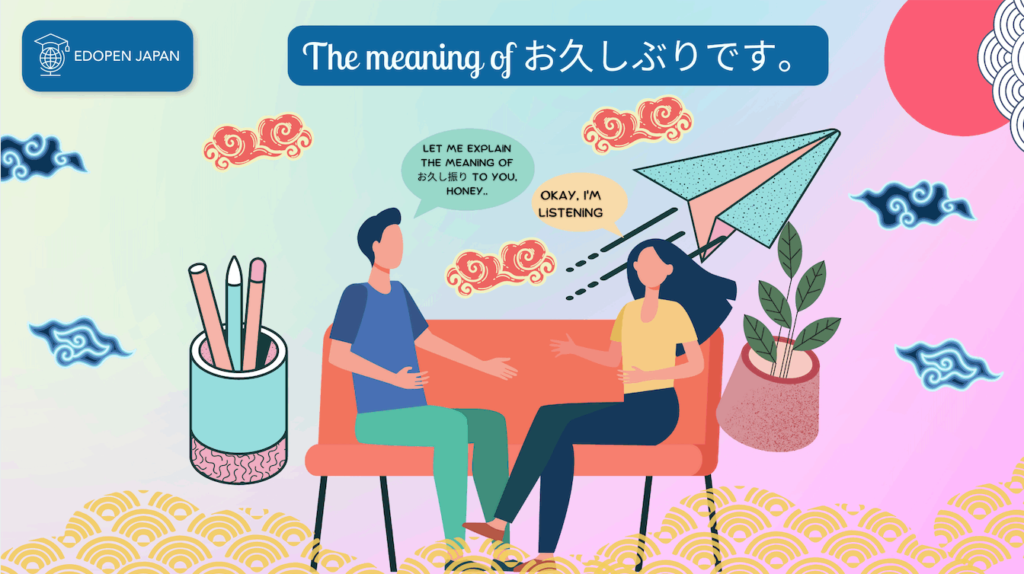
The words “お久しお久しぶりです ohisashiburi desu” or “久しぶり久しぶりです hisashiburi desu” are spoken when the speaker meets the other person who has not seen the speaker for a long time. “Ohisashiburi desu” expresses joy when the speaker meets the other person.
This greeting is often combined with the phrase “ogenki deshita ka”, which inquires about the condition of the other person as a “how are you” greeting, such as the following:
- “お久しぶりです。お元気でしたか?“
“Ohisashiburi desu. Ogenki deshita ka?”
Which means, “Long time no see. Have you been well?”
The ‘o’ prefix of ‘ohisashiburi desu’ is used to soften the word ‘hisashiburi’, which means ‘long time no see’ or ‘it’s been a while’, similar to ‘ogenki’ above. Meanwhile, “desu” also shows politeness to the other person, so this greeting can also be used as a polite greeting.
“Hisashiburi” is an informal form of “ohisashiburi desu” that is used to greet people who have not seen the speaker for a long time. Since “hisashiburi” is an informal form of “ohisashiburi desu” and has a friendly feel, this greeting can only be used for people who are closely related to the speaker, such as schoolmates, work colleagues, etc., who have not seen the speaker for a long time.
On the other hand, “hisashiburi” is not appropriate for people whose age/status is higher than the speaker’s, or for people who do not know the speaker.
3. About ご無沙汰しております。(Gobusata shite orimasu)
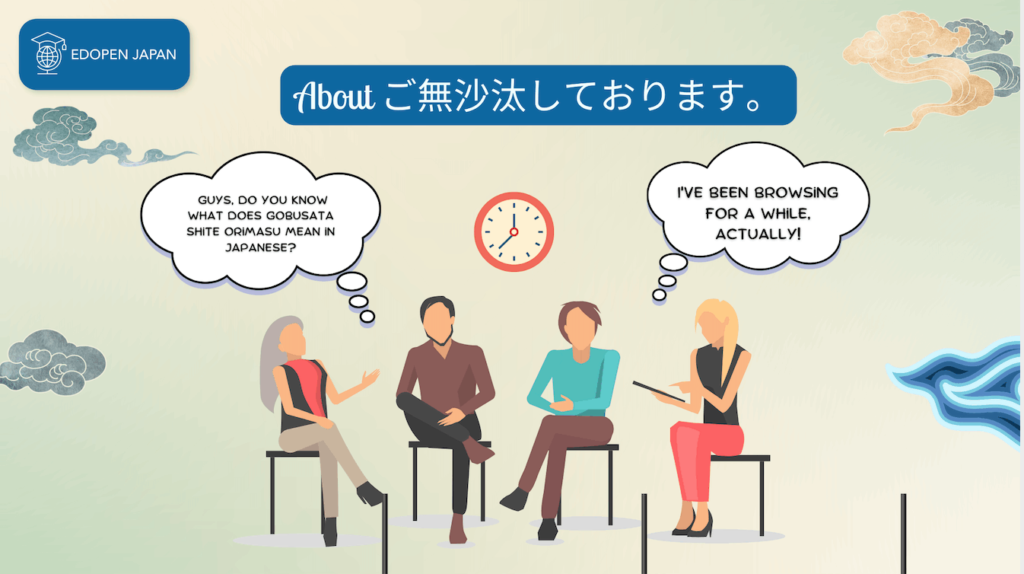
The expression “ご無沙汰しております。or Gobusata shite orimasu” is also used when the speaker meets the other person who has not seen the speaker for a long time, it means “It’s been a while (since…)”. “Gobusata shite orimasu” shows apologies when the speaker meets the other person because the speaker has not had time to meet the other person for a long time.
This greeting contains respectful language, a kind of self-deprecating language, so it is appropriate to use it for people who are older than the speaker, who have a higher status than the speaker, people who are respected by the speaker, or in the business world.
The difference between お久しぶりです (Ohisashiburi desu) and ご無沙汰しております (Gobusata shite orimasu)
Essentially, both ‘oisashiburi desu’ and ‘gobusata shite orimasu’ can be used to politely say ‘long time no see’. However, in general, “oisashiburi desu” is more likely to be said to people on the same or lower level as the speaker, although it can be used in a general way.
It’s best not to say “oisashiburi desu” to people of a higher status than the speaker, because there are still words that are more appropriate than “oisashiburi desu”.
Meanwhile, “gobusata shite orimasu” contains a very respectful language, a kind of self-deprecating language, so it is appropriate to use it for people who are older than the speaker, who have a higher status than the speaker, people who are respected by the speaker, or especially in the business world.
4. How to Use 元気? (Genki?) and 元気だった? (Genki datta?)
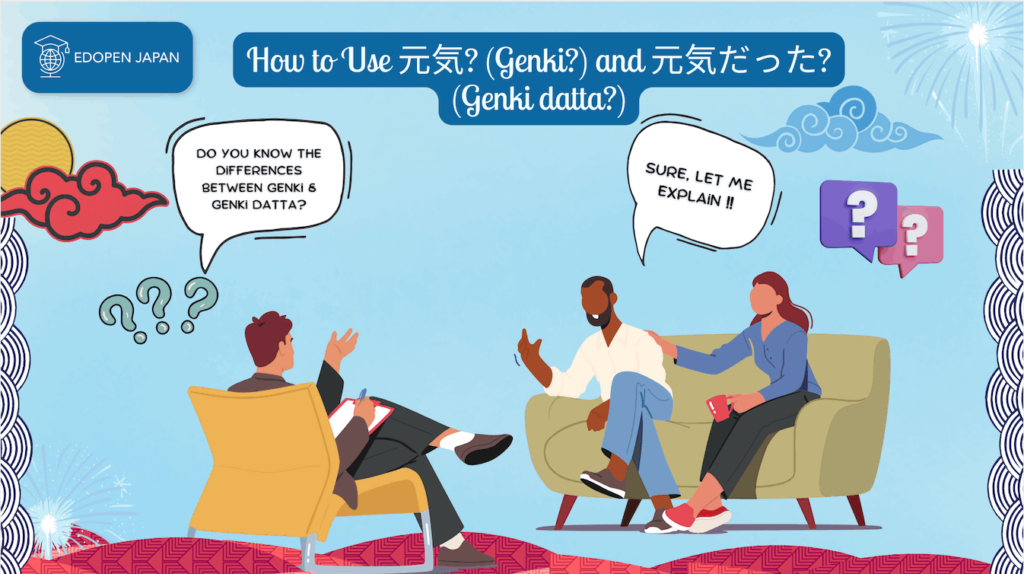
“元気? Genki?” is the informal greeting of “ogenki desu ka?”, which asks the state of the person you are talking to, such as “how are you?” in English. Similarly, “元気だった? genki datta?” is also the informal greeting of “ogenki deshita ka”, which is the past tense of “ogenki desu ka?”.
Both “genki?” and “genki datta?” are commonly used both in conversation and in writing to greet people who have not seen each other for a long time. The meaning is also almost the same as “genki desuka” and “ogenki deshita ka”.
However, these two greetings can only be used for people who are very close to the speaker, such as school friends, colleagues, etc. who haven’t seen each other for a long time due to various reasons such as illness, moving to another place, etc., or especially for old friends, such as school alumni, former co-workers, ex-girlfriends who haven’t seen the speaker for a long time.
Instead, please remember that it is not appropriate to say “genki?” and “genki datta?” to people who are older than the speaker, people whose status is higher than the speaker, people who do not know the speaker, or people who often meet the speaker.
About the term 最近どう? (Saikin Dou?)
The phrase “最近、どう? Saikin dou?” is said to be a friendly way of inquiring about one’s recent health. “Saikin dou?” is also informal and can only be used with people who are close or well known to the speaker.
On the other hand, “saikin dou” is not appropriate for people whose age/status is higher than the speaker’s, or for people who do not know the speaker.
The time adverb “saikin” means “recently”, while the question word “dou” means “how? Also, the correct translation of “saikin dou” into English is “what’s up”.
Finally, these are some explanations of the meaning and use of the greeting expression genki desu ka, along with some expressions related to genki desu ka?.
It can be concluded that genki desuka is a greeting used to casually inquire about someone’s news or condition. Hopefully, you find the above explanation easy to understand and useful.
Conclusion
To conclude this article, let’s take a look at the following points:
- Genki desu ka is a casual aisatsu or greeting in Japanese.
- Genki desu ka means “How are you?” or “Are you well?” in English.
- Genki desu ka is used to ask about the situation or news from the other person.
- Both genki desu ka and ogenki desu ka are usually used when meeting people you haven’t seen in a long time. However, ogenki desu ka is more formal.
In addition, there are also other phrases that are often used in ogenki desuka?, the phrases that express an attitude of respect for the other person. Using them can improve the quality of your Japanese, even when speaking with native speakers.

